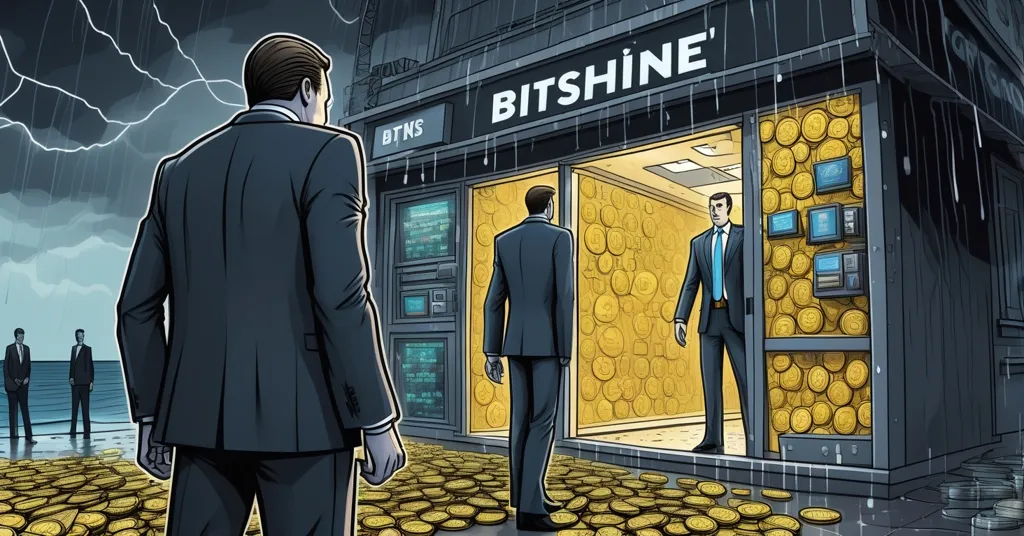Taiwan Busts $41M BitShine Crypto Scam: 14 Indicted in Massive Fraud Ring

$41M Crypto Scam: Taiwan Busts BitShine Fraud Ring with 14 Indictments
Taiwanese authorities have landed a heavy blow on a sprawling cryptocurrency fraud, indicting 14 individuals connected to the BitShine exchange scam for fleecing over 1,500 victims out of $41 million (NT$1.27 billion). This isn’t just a run-of-the-mill con; it’s a glaring spotlight on the unchecked corners of the crypto frontier and a loud demand for smarter oversight that doesn’t choke the life out of innovation.
- Massive Heist: Over 1,500 investors scammed out of $41 million through BitShine.
- Laundering Operation: Total laundered funds hit $75 million (NT$2.3 billion) from early to mid-2024.
- Legal Crackdown: 14 suspects charged with fraud, money laundering, and unlicensed crypto services.
How BitShine Orchestrated a $41M Rip-Off
Picture this: you walk into a slick storefront, hand over your hard-earned savings for what’s pitched as a “secure” crypto investment, only to find out it’s a complete sham. That’s the bitter reality for BitShine’s victims. Working hand-in-hand with an unlicensed outfit called Biying Technology, BitShine spun a web of deceit by falsely claiming to be the only exchange authorized by Taiwan’s Financial Supervisory Commission (FSC)—the country’s primary financial watchdog tasked with safeguarding consumers. For those new to the crypto space, this was a devastating lie; many took the claim at face value, not realizing a quick peek at the FSC’s official website would have exposed the fraud. Instead, their funds were funneled into digital assets like USDT, a stablecoin pegged to the US dollar for its supposed stability, and then shuffled overseas through a labyrinth of transfers to evade detection. Think of it as passing dirty cash through a dozen hands—by the end, the origin is nearly impossible to trace.
The operation wasn’t a solo act. A man surnamed Shih allegedly masterminded BitShine’s Taiwan operations, with his wife acting as the Asia-Pacific director and another suspect, surnamed Yang, managing the business side. This wasn’t some basement hustle; prosecutors allege deep ties to organized crime networks laundering crypto funds that instructed victims to transfer funds into controlled digital wallets—essentially online accounts for crypto—before converting and moving the money abroad. Between January and April 2024, the group laundered a staggering $75 million (NT$2.3 billion), exploiting the borderless nature of blockchain transactions to make recovery a nightmare for authorities and victims alike.
What’s especially galling is the facade of legitimacy BitShine built. They established over 40 franchise-style storefronts across Taiwan under names like CoinW and BiXiang Technology Co., Ltd., complete with “deposit machines” that raked in over one million yuan in fees. These physical locations gave the scam an air of credibility that purely online frauds often lack. Imagine handing over cash at what looks like a legit business, thinking you’re investing in the future of finance, only to realize you’ve fed a scam machine. Many victims, especially those less tech-savvy, didn’t think to double-check the regulatory claims—a fatal oversight in the Wild West of crypto markets, as detailed in analyses of how BitShine deceived investors.
Taiwan’s Crackdown: Seized Assets and Harsh Charges
When Taiwanese law enforcement finally moved in, the haul was massive. Raids netted NT$60.49 million in cash (roughly $2 million), 640,000 USDT, additional digital assets, and luxury items like high-end cars—proof this wasn’t just a financial crime but a lavish lifestyle built on shattered savings. The Shilin District Prosecutor’s Office came down hard, charging the 14 suspects with fraud, money laundering, operating unlicensed virtual asset services, and even forming a criminal enterprise. They’re pushing for a 25-year sentence for Shih, citing his apparent lack of remorse, while others who confessed might see lighter penalties. Prosecutors are also demanding the forfeiture of NT$1.275 billion in criminal proceeds alongside the seized assets, sending a clear message: Taiwan isn’t messing around.
In a twist of poetic justice, even the scammers got scammed. A separate individual, surnamed Gu, was indicted for defrauding Shih and his crew of NT$3 million by falsely promising to secure regulatory approvals for BitShine. Talk about a taste of their own medicine. While it’s a minor sideshow to the main event, it highlights just how cutthroat and shady the unregulated crypto space can be, even for those already on the wrong side of the law, as explored in discussions on BitShine fraud and related Taiwanese news updates.
Regulatory Gaps: Taiwan’s Struggle to Tame the Crypto Frontier
Zooming out, the BitShine debacle exposes the gaping holes in Taiwan’s crypto oversight. The FSC has been playing catch-up for years, introducing basic anti-money laundering (AML) guidelines back in 2019 and tightening reporting rules for crypto firms in 2024. Yet, a full-fledged framework for licensing virtual asset service providers (VASPs) remains elusive, creating a gray zone that fraudsters like BitShine exploit with ease. It’s like bringing a butter knife to a gunfight—good intentions, but nowhere near enough firepower to tackle sophisticated crypto crooks, a point underscored by insights into Taiwan’s regulatory shortcomings in the BitShine case.
This isn’t just a Taiwan problem; it mirrors global struggles seen in disasters like the FTX collapse of 2022, where false claims of legitimacy and unchecked money flows led to billions in losses. Stablecoins like USDT, often used for their ease of cross-border transfer, are a recurring tool for laundering in these scams, despite their genuine utility in decentralized finance (DeFi) and trading. With a market cap exceeding $100 billion, USDT isn’t going anywhere—policing its misuse, not banning it, is the real challenge for regulators worldwide, especially evident in details of USDT transactions in the BitShine scam.
Taiwan’s response to BitShine could be a turning point if it spurs smarter regulation rather than knee-jerk overreach. The FSC needs to fast-track comprehensive VASP licensing and enforce AML compliance to ensure exchanges can’t operate in the shadows. But let’s be clear: heavy-handed bans or suffocating rules risk killing the innovation and privacy that make crypto a revolutionary force. It’s a tightrope walk, and Taiwan’s next steps will be telling, especially with upcoming AML policies targeting crypto firms.
Blockchain: A Double-Edged Sword for Justice and Crime
Despite the ugly underbelly exposed by BitShine, there’s a flicker of hope in how blockchain’s transparency aided investigators. USDT transactions, often hosted on networks like Tron for their low fees, leave a public trail on the blockchain—a digital ledger anyone can view. Tools like Chainalysis, widely used by law enforcement globally, likely helped Taiwanese authorities map BitShine’s fund flows, turning crypto’s openness into a weapon against fraud. This duality is why I’m still bullish on decentralization as the future of money, even as a Bitcoin maximalist who often rolls my eyes at altcoin complexity. Crypto isn’t just a haven for crime; it can be a tool for accountability when wielded by savvy hands.
That said, the involvement of organized crime in BitShine’s operations is a punch to the gut for mainstream adoption. When criminal networks infiltrate the space, it fuels the tired narrative that crypto is inherently unsafe—a perception that could stall the financial revolution we’re fighting for. If we’re serious about effective accelerationism and pushing rapid, positive change through tech, we need robust Know Your Customer (KYC) protocols and on-chain analytics to root out bad actors without sacrificing the freedom and privacy that define crypto’s ethos.
Lessons for Investors: Dodging the Next BitShine
BitShine isn’t a failure of cryptocurrency; it’s a failure of human greed and regulatory lag. For investors, both newbies and seasoned players, this case is a harsh lesson in due diligence. Here are three red flags to watch for: promises of guaranteed returns, lack of verifiable licensing, and pressure to invest fast. Verifying an exchange’s credentials takes under five minutes—head to the FSC’s official list or any regulatory body’s database before parting with a dime. Secure your assets in personal wallets, preferably hardware ones like a Ledger or Trezor, rather than leaving them on exchanges. And if something smells fishy, trust your gut. Knowledge is your best defense in this Wild West.
Let’s not pretend crypto is unique in breeding scams. Billions have been lost in traditional finance frauds—think Enron or classic Ponzi schemes—where no blockchain existed to trace the money. The difference is, with crypto, the tech itself can help fight back if we use it right. Bitcoin’s bare-bones design as peer-to-peer digital gold sidesteps the convoluted DeFi traps BitShine exploited, though even BTC isn’t immune to human stupidity. Altcoins and stablecoins like USDT fill niches Bitcoin doesn’t, powering cross-border payments and complex protocols, but they also open doors for predators. The tech isn’t the enemy; the unchecked scumbags are.
The Road Ahead for Crypto Trust
BitShine is a black eye for the crypto space, no question. It shows how easily hype and trust can be weaponized by fraudsters. But it’s also a chance to evolve. Investors need to get street-smart, regulators need to get serious, and advocates like us need to keep hammering the point that decentralization isn’t the problem—it’s the solution when paired with accountability. Taiwan’s crackdown is a solid start, but the path to a fraud-free crypto future remains long and rough. We’ll keep exposing the good, the bad, and the downright ugly as this financial uprising unfolds.
Key Takeaways and Questions for Reflection
- Why did BitShine manage to deceive so many investors?
They leveraged fake FSC authorization claims and set up physical storefronts for credibility, while organized crime ties enabled sophisticated money laundering via crypto. - What does BitShine mean for crypto regulation in Taiwan?
It’s a glaring call for the FSC to accelerate VASP licensing and AML enforcement, closing gaps that let scams flourish without stifling innovation. - How does organized crime’s role impact crypto’s reputation?
It reinforces the false idea that crypto is a criminal tool, potentially slowing adoption unless countered by strong enforcement and public education. - What steps can investors take to avoid scams like BitShine?
Verify exchange licensing directly with regulators like the FSC, avoid guaranteed return promises, and store funds in secure personal wallets. - Can blockchain technology help combat fraud despite being exploited in scams?
Yes, its transparent ledger allowed tracking of USDT flows in this case, proving crypto can serve justice as much as it can be misused by criminals.



